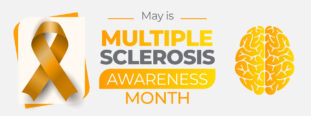Flu vaccine can prevent MS relapses
Influenza season is upon us, and everyone with multiple sclerosis is advised to get vaccinated against influenza. The reason is that an infection with the influenza virus can trigger a relapse in people with MS. One study found that 1 in 3 people with MS had a relapse in the 6 weeks after coming down with the flu (De Keyser and colleagues. J Neurol Sci 1998;159:51-53). A vaccination can prevent a person from getting the flu or make the illness less severe and will lower their risk of developing a relapse.
Three questions are often raised about the flu vaccine:
- Can the vaccine actually cause influenza? This can be a risk with some vaccines that use live virus. However, the flu vaccine uses inactivated virus, so it won’t give you influenza. The flu vaccine is considered safe to take no matter what MS medication you are on.
- Will a flu shot cause a relapse? Studies have shown that vaccination will not cause your immune response to flare up and cause an MS relapse (Farez and colleagues. Mult Scler 2012;18:254-256).
- Will people with MS respond to the vaccine? Vaccines work by introducing a pathogen into your body so that your body will learn to recognize it. If you do encounter the influenza virus, your body is ready to mount an immediate and effective immune response against that bug. But many people with MS take a disease-modifying therapy to suppress or alter their immune response. So is a person taking an MS drug able to mount an effective immune response to a virus?
A number of studies have examined this question. One looked at 108 people with MS who received the flu vaccine (Metze and colleagues. CNS Neurosci Ther 2018 ; epublished July 25, 2018). They found that 70% of people mounted an immune response, meaning that the vaccine would be effective in 70% of people. (Vaccines are not 100 percent effective and this is comparable to the effectiveness of the flu vaccine in people without MS.) The response rate was highest in people taking an interferon, and somewhat lower in people taking Tysabri or Gilenya. A second study reported similar findings (Olberg and colleagues. Eur J Neurol 2018;25:527-534). Other studies have found that people taking Tysabri do respond well to the flu vaccine (Vagberg and colleagues. Neurol Res 2012;34:730-733). The vaccine response was also not impaired in people taking Aubagio (Bar-Or and colleagues. Neurology 2013;81:552-558).
The timing of when you take your medication may have an impact on the effectiveness of the flu vaccine. So ask your doctor about when is the best time to go for your flu shot.
Share this article
Facebook Twitter pin it! Email
Related Posts
Back





